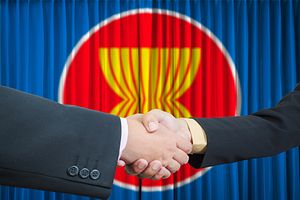The 26th ASEAN Summit concluded earlier this week in Malaysia. As usual with most ASEAN Summits, the South China Sea/West Philippine Sea issue was the focus of most media reports, along with a reported terrorist bombing plot aimed at disrupting the Kuala Lumpur meeting. The ASEAN Summit statement is available here.With regard to the ASEAN Economic Community and the ASEAN institutions in general, there were a few notable developments:ASEAN Common Time – this proposal, revived by Malaysia, was not accepted during the Summit. Reportedly Cambodia and Thailand objected to using Greenwich Mean Time + 8 (e.g., the time zone of China and Perth, Australia, as well as that of Singapore and Malaysia) as the common time. The Summit statement noted that ACT would be further considered, although it is not known whether that means considered at the next ASEAN Summit in November or postponed indefinitely (which happened the last time the ACT had been proposed).
ASEAN Institutions – ASEAN members expressed concern regarding the burdens on the ASEAN institutions, particularly the large number of sub-ministerial level meetings and having two ASEAN Summits a year. Issues regarding the former could be addressed by adopting the recommendations of the High Level Task Force on Strengthening the ASEAN Secretariat and Reviewing the ASEAN Organs, which call for increased use of communications technology and increasing the role of the Committee of Permanent Representatives. The latter appeared to be resolved, at least in the short-term, by allowing next year’s ASEAN Chair Laos to conduct both of the annual summits on a back-to-back basis, e.g., a de facto single summit, in November 2016.Timor-Leste – The Summit statement acknowledged that ASEAN was continuing to review the Timorese application to join ASEAN. Separately, the Philippines reiterated its support of Timor-Leste’s membership efforts.
EU-ASEAN FTA – The EU and ASEAN announced that they would undertake a stock-taking review of resuming FTA talks by the end of the year. Previous talks had started in 2007 but stopped in 2009, due to institutional/organization difficulties and political issues regarding the Myanmar military regime.
ASEAN Economic Community – The ASEAN Trade Facilitation Joint Consultative Committee will be reactivated, as will be the ASEAN Consultation to Resolve Trade and Investment Issues (ACT), which is basically an internet- based “complaint box” for companies to raise AEC issues anonymously with the ASEAN Secretariat (reportedly the previous ACT system was inoperable for months or years due to internet security issues). GOASEAN, a 24-hour ASEAN travel channel, was also launched. The Summit statement discussed the Initiative for ASEAN Integration, which deals with the economic development gaps in the region, but did not mention the Asian Infrastructure Investment Bank, newly funded by China.Regional Comprehensive Economic Partnership (RCEP) – the Summit statement reiterated that RCEP talks should aim to be concluded by end-2015. There are concerns that the RCEP talks could continue beyond 2015, mainly due to negotiating difficulties with certain RCEP negotiating parties.
Edmund Sim is an American international trade lawyer and partner in the trade boutique firm Appleton Luff. He also teaches at National University of Singapore law school and has served as an adviser to the ASEAN Secretariat and various ASEAN government ministries. This piece was originally published in his ASEAN Economic Community Blog here.
































